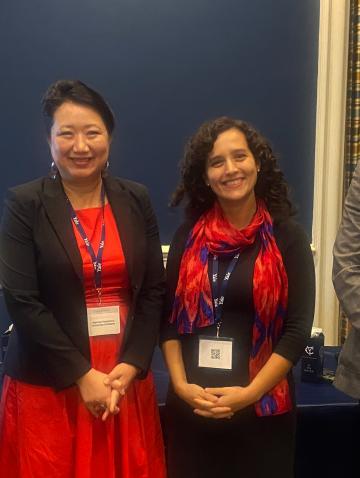Central Asia Initiative launched by the Russian, East European, and Eurasian Studies Program at the Yale MacMillan Center
On September 26, the Russian, East European, and Eurasian Studies (REEES) Program at the Yale MacMillan Center for International and Area Studies announced the launch of its multiyear Central Asia Initiative. Building on Yale’s strengths in Eurasian area studies—especially in the humanities, the environment, and geopolitics—this program aims to promote a deeper understanding of Central Asia and its relations with neighboring regions and the wider world.
The goal of the initiative is to cultivate a new generation of scholars and policymakers who are equipped to address the multifaceted history, languages, and art of Central Asia, as well as the complex contemporary challenges facing the region.
“From its early role as the forging ground of Eurasian political culture and non-western philosophy, to its contemporary significance as a crucial link in global networks of trade and resource exchange, Central Asia has played a critical and often unrecognized role in the making of the world as we know it,” said Molly Brunson, Associate Professor of Slavic Languages and Literatures and of the History of Art, and Director of the Russian, East European, and Eurasian Studies Program. “Drawing on the diverse and deep expertise of Yale faculty, the Central Asia Initiative aims to bring the region’s importance into focus for outsiders who might not otherwise recognize it. It also aims to foster increased interdisciplinary dialogue between scholars and students of Central Asia from within the region and outside of it.”
The Central Asia Initiative defines the region as encompassing the five Central Asian republics of the former Soviet Union: Kazakhstan, Kyrgyzstan, Tajikistan, Turkmenistan, and Uzbekistan; Afghanistan; East Turkestan (Xinjiang); and neighboring areas in Iran, the Caucasus, and the Russian Federation.
The Central Asia Initiative launch was announced before a panel discussion on “Geopolitics and the Environment in Central Asia” held at the university’s Yale @ Climate Week programming in New York City. Moderated by Claire Roosien, Assistant Professor of Slavic Languages and Literatures and Director of Graduate Studies for the European and Russian Studies master’s program, the panel featured Sarah Cameron, Togzhan Kassenova, and Taylor Zajicek, who spoke on Soviet-era environmental disasters in the region and their current impacts on human health, climate migration, nuclear power policies, and environmental restoration.
“The energy around Central Asian studies at Yale has grown fast with the hire of several new faculty in the field, the postdoctoral fellowship for Central Asian studies sponsored by the Council on East Asian Studies, and now the institutional commitment shown by establishing the Central Asia Initiative, which will not only expand our understanding of Central Asia, but also highlight its critical relevance in global conversations about sustainability, geopolitics, and cultural exchange,” said Roosien. “Personally, I’m excited to be a part of what I hope will be a foundational moment for the study of Central Asia at Yale and beyond. I hope the initiative will support excellent scholarship and genuine collaboration among scholars at Yale, around the world, and in the region itself.”
In planning the Central Asia Initiative, the REEES program has partnered with the European Studies Council, the Council on East Asian Studies, the Council on Middle East Studies—all housed at the MacMillan Center for International and Area Studies at Yale—as well as the Jackson School of Global Affairs and numerous departments. The initiative aims to further expand these collaborations in the coming years.
The next Central Asia Initiative event is scheduled for November 20, 2024 featuring writer and multi-media journalist Shahzoda Nazarova Samarqandi in conversation with Roosien and Assistant Professor of Comparative Literature Sam Hodgkin.
For more information on the Central Asia Initiative, please visit the Central Asia Initiative website or contact Molly Brunson, molly.brunson@yale.edu.

